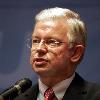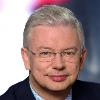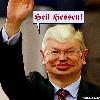

Roland Koch, Ministerpräsident des Landes Hessen, am 10. Januar 2008 bei einer Wahlkampfveranstaltung in Bensheim (Südhessen) Topics: Politics Tags: Roland Koch View |
CDU ist die Partei der Moral und Mea culpa ein unbekannter Begriff Wie die australische Presseagentur AAP am Donnerstag berichtete hat sich Papua Neuguinea bei den Fidschi Tags: Roland Koch View |
pete linke Maustaste = n�chstes Bild | rechte Maustaste = Bild versenden Tags: Roland Koch View |
|||||||||
Roland Koch (born March 24, 1958 in Frankfurt am Main) is a conservative German (Germany) politician and Minister-President of Hesse. He took office on April 7, 1999, immediately becoming President (President of the German Bundesrat) of the Bundesrat (Bundesrat of Germany), completing the term begun by his predecessor as Minister President, Hans Eichel.
In 1979 Koch became the youngest person to hold the office of chairmain of the CDU (Christian Democratic Union of Germany) in Main-Taunus district. From 1983 until 1987 he was vice-chair of the federal youth organization of the CDU. In 1985 he completed his studies to become a lawyer.
Until 1993 Koch was a city council member in his hometown of Eschborn. He was also a member of the Main-Taunus district council and parliamentary leader of the local CDU group from 1989 until 1997. In 1987 he got elected to the legislature of Hessen, where he became vice-chair of the CDU parliamentary group in 1991 and in 1993 its chair. Since 1998 he has also been chair of the Hessian state party.
Koch is seen as a rhetorically gifted politician; critics have accused him of populism. In the state elections in 1999, the CDU began collecting signatures to document the resistance in the population to plans of the federal government to make dual citizenship easier for foreigners to obtain. Because some people viewed this action as "collecting signatures against foreigners", they tried to portray this campaign as "xenophobic". Koch was able to win the election and displace the incumbent, Hans Eichel.
In November 2006 Koch was elected vice-chairman of the CDU (Christian Democratic Union (Germany)).
Prior to the Hesse state election of 2008 (Hesse state election, 2008) Koch was once again accused of using xenophobic tactics by pledging to get tough on youth crime, which is concentrated among immigrant and minority groups. In the course of the election he lost his partys majority in the Hessian Parliament, but remained acting Minister President as his SPD challenger Andrea Ypsilanti was unable to form a government.
Since none of the parties was able to build a majority coalition, they decided to give the voters another chance to produce a workable result. In the January 2009 election (Hesse state election, 2009) the FDP made significant gains which allowed Koch to form a conservative-liberal coalition government, reelecting him as the Minister President of the State of Hesse.
On 25th May 2010 Koch announced his withdrawal from the political scene. He intends to step down as Minister-President of Hesse by 31st August 2010. He hinted that he was departing politics in order to become active in the business world.
His father Karl-Heinz Koch was also a politician in Hessen. Koch and his wife Anke have two sons. He is a Roman Catholic.
Date of birth: 1958-03-24
Birth Location: Frankfurt am Main, West Germany
Nationality: German (Germany)
Party: CDU (Christian Democratic Union (Germany))
Religion: Roman Catholic
Minister President of Hesse
In office: 1999
Predceded by: Hans Eichel



